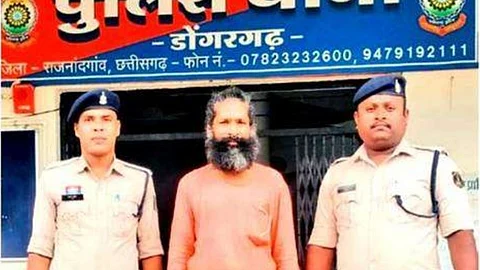

The arrest of well-known international yoga guru Tarun Agrawal alias Sonu, now revealed to be a drug dealer operating out of an ashram near Pragya Giri hills in Dongargarh, Chhatisgarh, has exposed yet another disturbing underbelly of Goa’s ‘spiritual tourism’ scene.
Speaking toO Heraldo, Jitendra Verma, in-charge of Dongargarh Police Station, informed that the arrested accused, known as Tarun Agarwal, was operating Kranti Yoga at Patnem beach in Canacona, South Goa. Agarwal, a permanent resident of Chhattisgarh, had changed his name on his Aadhaar Card to Yogi Tarun Kranti Agarwal with an address in Patnem, according to the officer.
Verma revealed that Agarwal was known as the founder and managing director of Kranti Yoga, which offers certified yoga classes. Agarwal had been staying in Goa for almost 20 years before moving back to Dongargarh three months ago to set up an ashram. His beach-front yoga retreat in Patnem, which he allegedly used to float NGOs and seek international funding, was a front for a sophisticated narcotics racket. Dongargarh Police arrested Agarwal with nearly 2 kg of cannabis.
According to police, over the two decades he spent in Goa, Agarwal developed a solid network under the cover of wellness and meditation. His yoga centre was frequented by foreign tourists, many of whom attended expensive retreat packages, detox workshops, and ‘spiritual healing’ programmes. After gaining popularity in Goa’s alternative lifestyle circuit, Tarun was looking to replicate the same model in Dongargarh, but the police acted on time.
“He had a deep network. Foreigners came and went frequently, but no one ever thought to ask what was really going on,” said a resident of Colomb-Canacona, on condition of anonymity.
Tarun claimed to be the director of over 10 NGOs, with alleged foreign funding. Investigative agencies are now investigating these organisations for possible links to money laundering and drug trafficking. His Patnem address in Goa is now part of the investigation trail.
Sources confirmed that the equipment, foreign-imported boxes, and video materials seized from his Dongargarh ashram may have been routed through Goa.
However, Canacona Police Station PI Harish Raut Desai, confirmed that Agarwal’s name has never been linked to any criminal case in Goa.
Tarun’s story is not unique though. In recent years, Goa has become a haven for white-collar and narcotics-linked criminals, many of whom find safe shelter in Goa while operating illicit businesses. The trend has raised serious questions about the state’s policing, local intel gaps, and unchecked inflow of foreign funds.
Just weeks ago, young boys involved in crypto currency fraud were nabbed while hiding in Calangute. Last month, a fugitive from Haryana wanted in a land scam was found running a homestay in Ashwem. Earlier this month, a Rajasthan native wanted in NDPS and other criminal cases, was found operating a couple of liquor stores in Goa.
“In the name of tourism, people are coming to Goa with criminal intentions, setting up businesses, and using Goa’s relaxed ecosystem to launder money, conduct drug trade, or hide from the law,” said retired Superintendent of Police Bossuet D’Silva. “Today’s policing is lax. Earlier, beat constables were the eyes and ears of police and had excellent contact with locals and hence were able to collect qualitative intelligence.”